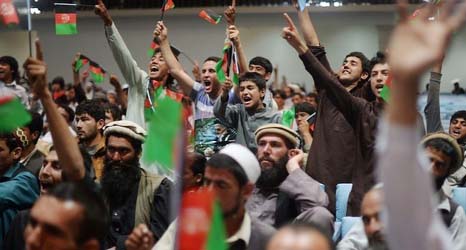
BBC Online :
Afghans are voting in run-off polls that will determine who will succeed President Hamid Karzai.
The choice is between former Foreign Minister Abdullah Abdullah and ex-World Bank economist Ashraf Ghani. It should be the first time that power in Afghanistan has been democratically transferred.
But the Taliban has threatened to target polling stations and there are concerns that voting fraud could produce a disputed result.
As most foreign soldiers prepare to withdraw by the end of this year, whoever becomes the new leader will take over a country where Taliban insurgents remain active, where the economy is weak, where corruption is endemic and where the rule of law is for the most part unenforced.
The Taliban have pledged to do their utmost to disrupt the vote with “non-stop” assaults.
“By holding elections, the Americans want to impose their stooges on the people,” the insurgents said on their website.
Afghans who’ve lived through all the devastating wars since President Najibullah’s Soviet-backed rule are hoping this election will help turn the page on their punishing history.
It will be the first time in Afghan history that power is transferred peacefully, from one elected leader to another.
Months of vigorous campaigning, and an impressive turnout in the first round of voting, were a strong testament to a country determined to move forward in the face of Taliban threats and violence.
Despite all the disappointments and setbacks since 2001, Afghanistan is now a changed country.
When Afghans turn out to vote for this crucial second round, it will be a test of their security forces as well as the electoral institutions.
About 12 million Afghans are eligible to vote. Polls opened at 0700 local time (0330 BST) amid tight security at more than 6,000 polling centres.
Mr Abdullah won 45% of the first-round vote, with Mr Ghani securing 31.6% – multiple fraud claims were made against both sides. The pair came top of an eight-man field, but because neither reached the 50% threshold needed for an outright victory, Saturday’s run-off election was necessary.
Correspondents say that a seamless transfer of power would be a significant achievement for Afghanistan and a vindication of international efforts to establish a functioning democracy after the abuses of the Taliban era.
But Afghanistan’s mountainous and remote terrain, coupled with the dilapidated condition of many of its roads, mean that holding a country-wide election is a major challenge. Thousands of donkeys will be deployed to carry ballot boxes to some of the more inaccessible villages.
The preliminary result is expected on 2 July and the final result on 22 July.
Security has been tight in the run-up to the vote, with police and soldiers searching most cars going into Kabul. Officials say that they are confident that Western-trained security forces will be able to provide a safe environment for voters. “The level of threats is higher compared to the first round,” Interior Minister Omar Daudzai was quoted by the AFP news agency as saying.
“But we have gained far more experience and we have better equipment and are in a much better position to prevent any possible attack by terrorists.”
Officials say that their main fear is a close outcome, because that would allow the supporters of whoever loses to reject defeat, possibly throwing the country back into war along ethnic lines.

